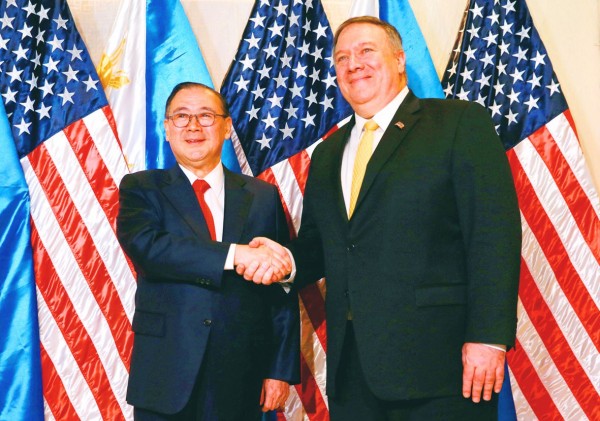《TAIPEI TIMES》 US will defend the Philippines: Pompeo

Philippine Secretary of Foreign Affairs Teodoro Locsin, left, shakes hand with US Secretary of State Mike Pompeo at the Philippine Department of Foreign Affairs in Pasay City, Philippines, yesterday. Photo: Reuters
‘WE HAVE YOUR BACK’: Mike Pompeo’s comments marked the first time any US official had publicly stated Washington’s intent to defend the Philippines in the South China Sea
/ AFP, MANILA
US Secretary of State Mike Pompeo yesterday vowed to defend the Philippines against “armed attack” in the disputed South China Sea, in Washington’s starkest warning yet against Chinese claims to most of the strategic waterway.
Speaking in Manila after meeting with Philippine President Rodrigo Duterte, Pompeo said Beijing’s artificial islands in waters also claimed by the Southeast Asian nation and its neighbors was a threat.
“China’s island-building and military activities in the South China Sea threaten your sovereignty, security and therefore economic livelihood, as well as that of the United States,” he said at a joint news conference with Philippine Secretary of Foreign Affairs Teodoro Locsin. “As the South China Sea is part of the Pacific, any armed attack of Philippine forces, aircraft or public vessels in the South China Sea will trigger mutual defense obligations under Article 4 of our Mutual Defense Treaty.”
Pompeo’s comments marked the first time any US official had publicly stated Washington’s intent to defend its poorly armed ally specifically in the flashpoint sea.
A 1951 US-Philippine mutual defense treaty committed Manila and its former colonial master to come to each other’s aid in case of an “armed attack in the Pacific area” on either party.
Senior Duterte officials had called for a review of the pact because they were unsure whether it applied to the maritime dispute.
Philippine troops and fishers have frequently complained about harassment by Chinese maritime security forces around some of the islands and reefs Manila occupies.
The US has said that it is not taking sides in the dispute over the waters claimed in whole or part by Taiwan, China, the Philippines, Brunei, Malaysia and Vietnam.
However, Washington has asserted its right to freely sail the waters through which trillions of US dollars of global trade pass each year, and which reputedly contain vast mineral and oil reserves.
The Philippines used to be the staunchest critic of China’s expansive claims over the sea, but after his election in 2016, Duterte put the dispute on the back burner in favor of courting Chinese trade and investment.
He threatened a split with the US and called then-US president Barack Obama a “son of a whore.”
Relations are being rebuilt under US President Donald Trump, who has hailed Duterte’s actions — including a drugs crackdown that has claimed thousands of lives — as a sign of toughness.
Locsin yesterday downplayed his government’s suggestions for a review of the defense pact, saying in its “vagueness lies the best deterrence.”
“We are very assured, we are very confident that [the] United States has, in the words of Secretary Pompeo and [the] words of President Trump to our president: We have your back,” Locsin said.
Doubling down on China, Pompeo also warned the Philippines and other nations against using technology from Chinese firm Huawei Technologies Co (華為).
The Philippines’ Globe Telecom plans this year to roll out commercial 5G services with Huawei, while the Duterte government last year signed an US$400 million deal for Huawei to install closed-circuit TV cameras in two Philippine cities to deter crime.
US officials suspect that Beijing could use the Shenzhen-based company’s products to spy on other governments. The company denies the allegations.
Pompeo said using Huawei technology carried risks.
“We want to make sure that the world has their eyes wide open as to the risks of having that technology be part of the infrastructure or backbone of networks,” Pompeo said. “We believe that competition, whether it’s in 5G or some other technology, ought to be open, free, transparent and we worry that Huawei is not that.”
新聞來源:TAIPEI TIMES
%http://www.taipeitimes.com/










